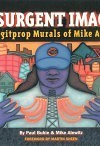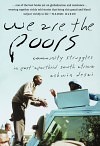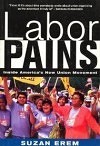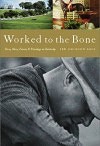Movements

The most prolific U.S. labor muralist since the 1940s, Alewitz follows the traditions of Diego Rivera, José Clemente Orozco, and David Siqueiros as well as the early painters of the Russian Revolution. With a demonstrated blend of artistic integrity and political commitment, Insurgent Images combines grand historical themes with enlivening detail, to illustrate the interplay between personality and event. Alewitz brings to this tradition his own rich sense of irony, humor, and fantasy to illuminate the hidden spaces where connections between the workforce of the U.S. and its extended relatives across the planet are to be found. | more…
Readers may remember that in last year’s summer issue on labor we talked about a roundtable organized by MR for activists in the labor movement and held in our office in New York last March. The idea was to provide a forum for labor activists to establish connections among themselves and to discuss issues of common interest at a particularly important historical moment, at a time when the labor movement in various parts of the world, including the United States, is beginning to show signs of renewal. We also hoped to revive the long dormant connection between the socialist left and the labor movement, and we were very pleased to discover that people within the movement were anxious to work with us too. | more…
What’s remarkable about the aftermath of Ron Carey’s removal as a candidate for Teamsters president is the staying power of the reform movement. Most predicted the union would quickly fall back into the hands of the mobbed-up Old Guard, personified by James Hoffa, Jr. But in recent local elections rank and file members have chosen to carry on with the business of reform, without the man who once symbolized those changes in the Teamsters | more…

When Nelson Mandela was elected president of South Africa in 1994, freedom-loving people around the world hailed a victory over racial domination. The end of apartheid did not change the basic conditions of the oppressed majority, however. Material inequality has deepened and new forms of solidarity and resistance have emerged in communities that have forged new and dynamic political identities. We Are the Poors follows the growth of the most unexpected of these community movements, beginning in one township of Durban, linking up with community and labor struggles in other parts of the country, and coming together in massive anti-government protests at the time of the UN World Conference Against Racism in 2001. | more…
Human rights were embodied in international law for the first time half a century ago. According to the United Nations Charter, one of the goals of the organization is international cooperation “to advance and strengthen the respect of human rights and basic freedoms for all people, regardless of race, sex, language and religion.” The thirty articles of the Universal Declaration of Human Rights of 1948 set out in detail the UN Charter’s goal of international cooperation for the advancement of human rights and basic freedoms. The Convention on Prevention and Prosecution of Genocide of the same year is a great advance and landmark in the body of international law, binding on the states that have ratified it. These two achievements, which came at the very moment of the inception of the cold war, were due to the continuing democratic-antifascist impetus of the struggle and victory of the Anti-Hitler coalition in the Second World War. In the verdicts at Nuremberg the Nazi leaders were not only convicted of war crimes but also of crimes against humankind | more…
Work, Family, and Capitalism
Socialists have long contended that capitalism produces distinctive and undesirable structures of time. Marx argued that capitalism created an ineluctable downward pressure on wages, forcing workers to work long hours in order to earn enough to sustain themselves. By the same token, lengthening the working day was one of the ways by which employers could increase the production of surplus-value. Marx’s son-in-law, Paul Lafargue, added that capitalism disciplined workers by creating a kind of ideology of work, a moral compulsion to labor; although, in Lafargue’s view, this was in part responsible for capitalism’s periodic crises of overproduction, it was one of the ways by which employers were able to enforce work discipline | more…
A Feminist Model of Labor Organization?
Balloons transformed Harvard Yard on May 17, 1988, the day the “servants of the university,” as workers were originally called, voted on whether to join the Harvard Union of Clerical and Technical Workers (HUCTW), an affiliate of AFSCME. “Ballooning” lightened the tension, but Kristine Rondeau, lead union organizer, had a grim warning for her staff: “You did a wonderful job. But we don’t have it … It’s very likely we didn’t win.”1 In fact, by a slim margin, they did have it. One of the most influential universities in the world had been outsmarted by some of its unknown employees, mostly women | more…
We are writing at the end of August. The two main events of the summer have been (1) the apparent ending of the long stock-market boom of the last few years, and (2) the successful strike of the teamsters against UPS. Neither can be said to have been anticipated and together they point to the emergence of new trends in the period ahead. | more…

Labor Pains is an insider’s account of the struggle to rebuild a vibrant and powerful trade union movement in the United States. It takes as its starting point the daily experience of a union organizer, and brings that experience to life. It enables us to grasp how the conflicting demands of race, class, and gender are lived in the new union movement. | more…
After a long period of sustained attack by governments of various stripes, a steady deterioration of working and living standards, and declines in membership and militancy, there are encouraging signs that organized labor is moving again. This may come as a surprise to many, not least on the left, who have long since written off the labor movement as an oppositional force; and it may begin to challenge some of the most widespread assumptions about the nature and direction of contemporary capitalism, assumptions often shared by activists and intellectuals on the left as well as the right.…Although it is, of course, too early to make big claims about this trend, it does seem to be a good moment to take a close look not only at these new signs of activism but also at the nature of labor today and at the environment in which the labor movement now has to navigate. | more…

Worked to the Bone is a provocative examination of race, class and the mechanics of inequality in the United States. In an engaging and accessible style that combines thoroughly documented sociological insight with her own compelling personal narrative, Pem Buck illustrates the ways in which constructions of race and the promise of white privilege have been used at specific historical moments in two Kentucky counties to divide those who might have otherwise acted on common class interests. | more…
In the late l930’s I sat in on a course of education for trade unionists. That these workers had a desire to learn was evident by their enrollment in a class held in the evenings, after they had done a day’s work. That the teacher knew his subject was manifest from the brilliance of his lecture. That the combination of students’ desire and teacher’s grasp of the material did not result in learning was obvious from the fact that before the hour was over, several members of the class were asleep; it was apparent, too, from the decline in enrollment—the next class was attended by only half the students, and the third time the class met, less than a quarter who had signed up were in attendance. | more…



